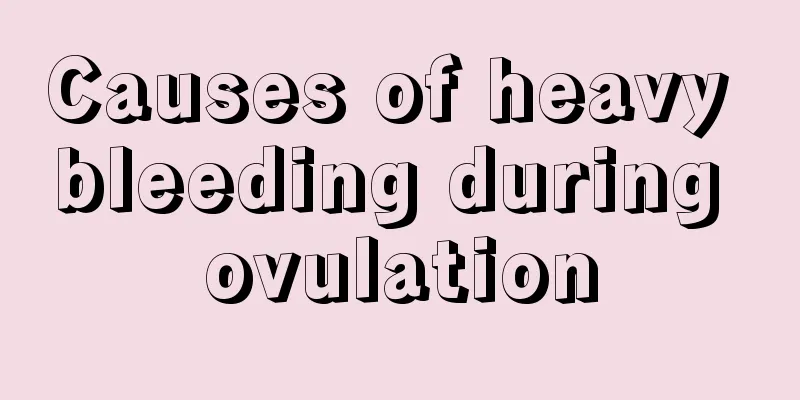Causes of heavy bleeding during ovulation

|
Nowadays, many female friends are just working hard and have no idea about some changes in their bodies. Especially for some female friends who want to get pregnant, they should pay more attention to their ovulation period. They may experience heavy bleeding during ovulation. Let us understand the reasons for heavy bleeding during ovulation. main reason: In fact, ovulation bleeding is a phenomenon that every female friend may experience. Generally, the amount of bleeding is very small and cannot be observed with the naked eye, but some people will have obvious bleeding symptoms, and the severity cannot be generalized. But in fact, the main reason for ovulation bleeding is that after the mature follicle ruptures and ovulates, the estrogen level drops sharply, which cannot maintain the growth of the endometrium, causing local ulceration and shedding of the surface layer of the endometrium, resulting in breakthrough bleeding in small amounts. Sufficient estrogen and progesterone are secreted to quickly repair the ruptured surface of the endometrium and stop the bleeding. Or it is possible that during ovulation, the mature follicles secrete more estrogen, causing endometrial congestion and leakage of red blood cells. It is also possible that when the egg is captured in the fimbria of the fallopian tube, the blood-containing follicular fluid is sent to the uterine cavity through the retrograde peristalsis of the fallopian tube and then flows out of the cervix through the vagina. When examining the cervical mucus of women who ovulate during the mid-term period, it is found that about 60% of them have red blood cells under microscopic observation, but no bleeding can be seen with the naked eye. This is not a pathological phenomenon; but women with ovulation bleeding must rule out other reproductive tract diseases, such as irregular menstruation, cervical erosion, cervical polyps, cervical cancer, endometrial polyps, submucosal uterine fibroids, endometrial adenocarcinoma, etc. Of course, it is also possible that the secretion of sex hormones is out of balance, causing the hormone levels to fluctuate greatly during ovulation and resulting in obvious bleeding. Chronic inflammation of the endometrium or inflammatory thickening of the ovarian surface causes significant endometrial congestion during ovulation, and bleeding is not easy to stop on its own, or the inflammatory thickened follicle surface ruptures and bleeds more than normal, and flows back into the uterine cavity with the peristalsis of the fallopian tube and is discharged from the body through the vagina. Vaginal bleeding visible to the naked eye may last for several hours, or 3 to 5 days, but rarely for more than 7 days. In severe cases, it may continue to occur until the next menstrual period. Some women have very little bleeding, which stops with a few drops, or there is blood mixed in the vagina. Generally, it rarely reaches the amount of menstruation. Bleeding may be accompanied by distension and discomfort, dull pain or obvious pain in one side of the lower abdomen, and may even involve the waist and inner thigh. Symptoms may occur continuously every month or every other month. For some people, they occur for several months each year, while for others, they only experience this phenomenon once in their lifetime. Ovulation bleeding is caused by a brief and rapid drop in estrogen levels after ovulation, which causes the endometrium, which is proliferating under the influence of estrogen, to lose support and cause a small amount of bleeding. Or during ovulation, the blood vessels on the surface of the ovary rupture and bleed, flowing into the uterine cavity through the fallopian tube and out through the vagina. The amount of bleeding was very small, just a few drops. If a woman experiences heavy bleeding that lasts for a long time, it may be caused by reproductive tract disease. It is not normal ovulation bleeding and she needs to seek medical attention promptly. The above article gives you a detailed introduction to the reasons for heavy bleeding during ovulation. I believe everyone already has a basic understanding. If you experience heavy bleeding during ovulation, you still need to go to the hospital for an examination. |
<<: The dangers of hemorrhoid surgery in women
>>: What are the best ways to tighten the vagina after childbirth?
Recommend
How to apply purple eyeshadow beautifully
When we apply eye shadow, we will find that there...
Is the caulking agent waterproof and leakproof? What are the effects of using the caulking agent in winter?
In fact, it is still very necessary to beautify t...
Diet after endometrial polyp surgery
Uterine intrauterine polyps mainly occur after wo...
What is the reason why women always fart?
Generally, female friends will have various probl...
Be careful, these "mountain and sea delicacies" are attacking your summer vacation
Author: Li Haijie, School of Public Health, North...
Leucorrhea is like tofu residue and has no smell
Discharge is a liquid secreted from the vagina of...
Postpartum uterine involution detailed introduction
Female friends will appear very weak after giving...
When is the best season to eat cherry tomatoes? Cherry tomato varieties
Cherry tomatoes are bright red and transparent, w...
How to get pelvic effusion
When pelvic effusion occurs, it will not only cau...
Will cervical removal affect my sex life?
The cervix is an organ unique to women, which i...
Can I eat loquat paste when I am pregnant?
Loquat paste is mainly a Chinese patent medicine ...
Why does eating dumplings raise blood sugar so quickly? Six ways to eat dumplings safely
Dumplings seem to contain meat and vegetables, bo...
Specific medicine for female urinary tract infection
Female friends must receive thorough treatment af...









